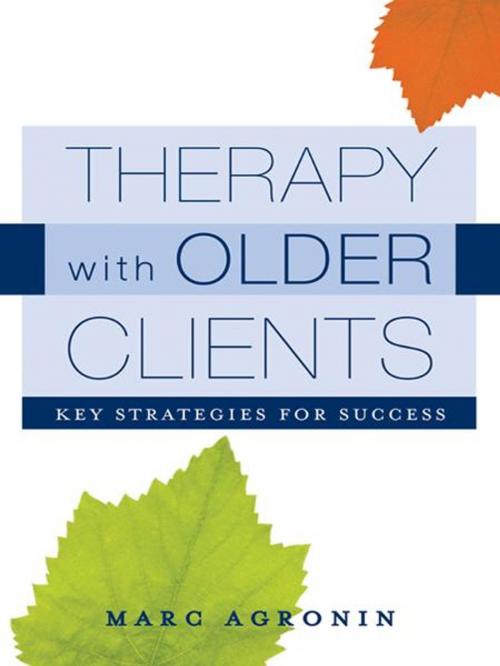Therapy with Older Clients: Key Strategies for Success
Nonfiction, Health & Well Being, Psychology, Education & Training, Psychotherapy| Author: | Marc Agronin | ISBN: | 9780393707168 |
| Publisher: | W. W. Norton & Company | Publication: | July 19, 2010 |
| Imprint: | W. W. Norton & Company | Language: | English |
| Author: | Marc Agronin |
| ISBN: | 9780393707168 |
| Publisher: | W. W. Norton & Company |
| Publication: | July 19, 2010 |
| Imprint: | W. W. Norton & Company |
| Language: | English |
Basic strategies and tips for doing effective therapy with elderly clients.
What is it like to be 106 years old? What are the mental health needs of someone this old, and for that matter, all elderly? Can we, as clinicians and caregivers, ever really understand old age and provide for their needs adequately? How can we prevent the physical problems they face from overwhelming the patience and care that we give? What are the most effective therapeutic tools that underlie all successful therapy work with older clients?
Caring for the elderly is complex, challenging work. Often they are wrestling with a unique set of medical, psychiatric, and social challenges, all set against the backdrop of their approaching mortality. The therapist’s job is to successfully navigate these challenges without dwelling on the inevitability of physical decline, and to provide the most compassionate, valuable treatment possible. It is with this guiding principle in mind that Marc Agronin, a dedicated geriatric clinician with years of on-the-ground experience, offers a sensitively-written and eminently practical guide that addresses the therapeutic challenges, and uncovers the top strategies for compassionate and effective work with the elderly.
Therapy with older clients, Agronin argues, requires a sensitivity to the tension between the body’s physical decline and its simultaneous capacity for mental growth and maturation. Therapists must learn to handle these seemingly opposing forces with varying client types and in different settings, and reconcile their own fears of aging, disability, and death. At times this therapeutic relationship can be difficult: medications are often not as effective as they are in younger clients, and the elderly often view change at such a late stage of life as pointless. However, Agronin encourages therapists to work with creativity and passion, persisting in their efforts by retooling their approaches, shoring up patience, and remembering that the very presence of a caring listener can bring a spectacular transformation to even the most debilitated individuals.
An understanding of aging alone does not make an effective therapist, and Agronin offers key strategies—illustrated through real-life case examples—for dealing with countertransference, performing age-guided evaluation, working with caregivers, and handling end-of-life issues. He explains the impact of aging on the major psychiatric disorders, providing direction on how to cultivate empathy and understanding for a range of age-specific challenges. Agronin offers a compassionate, insightful narrative that explores the nuances of successful rapport-building and problem-solving that can enrich the lives of the elderly. In doing so, he gives readers a better understanding of what it means to grow old, and how cultivating a respectful, productive relationship—one that is inspired with curiosity and energized with creativity—can bring joy and affirmation to older clients.
Basic strategies and tips for doing effective therapy with elderly clients.
What is it like to be 106 years old? What are the mental health needs of someone this old, and for that matter, all elderly? Can we, as clinicians and caregivers, ever really understand old age and provide for their needs adequately? How can we prevent the physical problems they face from overwhelming the patience and care that we give? What are the most effective therapeutic tools that underlie all successful therapy work with older clients?
Caring for the elderly is complex, challenging work. Often they are wrestling with a unique set of medical, psychiatric, and social challenges, all set against the backdrop of their approaching mortality. The therapist’s job is to successfully navigate these challenges without dwelling on the inevitability of physical decline, and to provide the most compassionate, valuable treatment possible. It is with this guiding principle in mind that Marc Agronin, a dedicated geriatric clinician with years of on-the-ground experience, offers a sensitively-written and eminently practical guide that addresses the therapeutic challenges, and uncovers the top strategies for compassionate and effective work with the elderly.
Therapy with older clients, Agronin argues, requires a sensitivity to the tension between the body’s physical decline and its simultaneous capacity for mental growth and maturation. Therapists must learn to handle these seemingly opposing forces with varying client types and in different settings, and reconcile their own fears of aging, disability, and death. At times this therapeutic relationship can be difficult: medications are often not as effective as they are in younger clients, and the elderly often view change at such a late stage of life as pointless. However, Agronin encourages therapists to work with creativity and passion, persisting in their efforts by retooling their approaches, shoring up patience, and remembering that the very presence of a caring listener can bring a spectacular transformation to even the most debilitated individuals.
An understanding of aging alone does not make an effective therapist, and Agronin offers key strategies—illustrated through real-life case examples—for dealing with countertransference, performing age-guided evaluation, working with caregivers, and handling end-of-life issues. He explains the impact of aging on the major psychiatric disorders, providing direction on how to cultivate empathy and understanding for a range of age-specific challenges. Agronin offers a compassionate, insightful narrative that explores the nuances of successful rapport-building and problem-solving that can enrich the lives of the elderly. In doing so, he gives readers a better understanding of what it means to grow old, and how cultivating a respectful, productive relationship—one that is inspired with curiosity and energized with creativity—can bring joy and affirmation to older clients.















